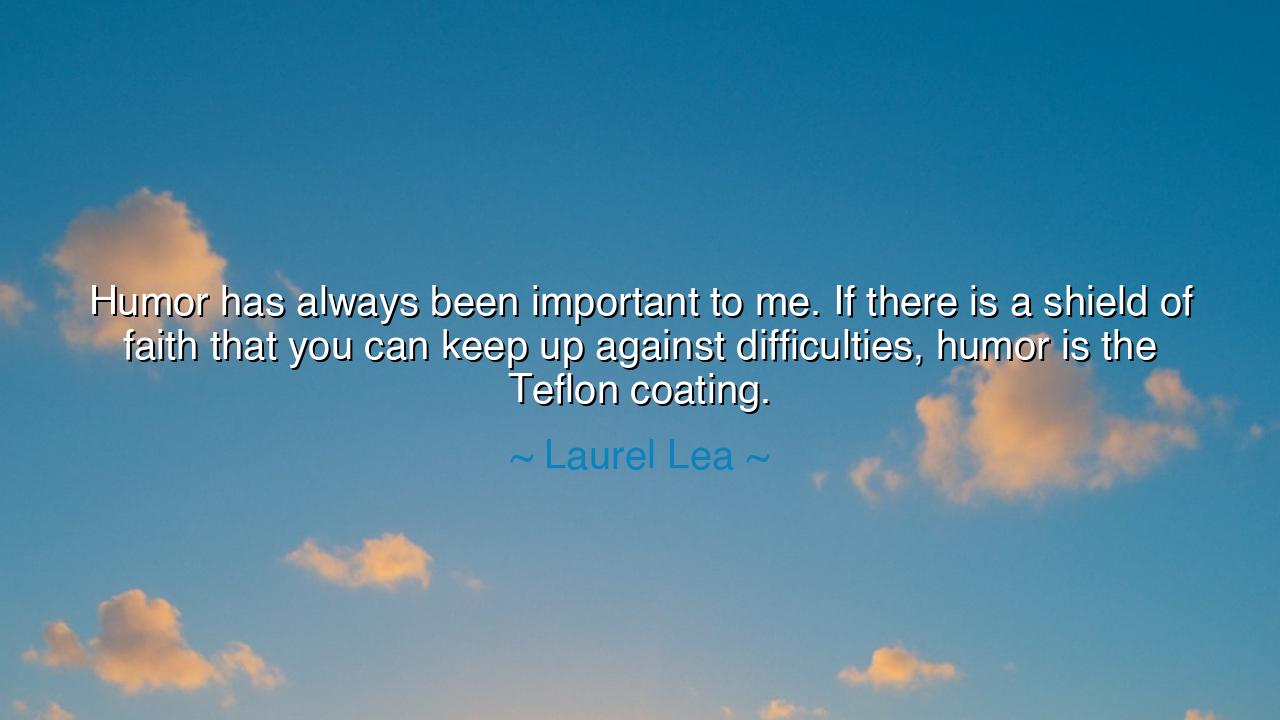
Humor has always been important to me. If there is a shield of
Humor has always been important to me. If there is a shield of faith that you can keep up against difficulties, humor is the Teflon coating.






Listen closely, O seekers of wisdom, to the words of Laurel Lea, who imparts a truth that resonates with the hearts of those who face the struggles of life: "Humor has always been important to me. If there is a shield of faith that you can keep up against difficulties, humor is the Teflon coating." In these words, we find a profound understanding of the human spirit’s need to endure through hardship, and how the gift of humor serves as a shield against the arrows of suffering, disappointment, and despair. Just as a shield protects the warrior in battle, humor protects the soul from being overwhelmed by the darkness of life.
In the ancient world, the great philosophers and warriors understood the need for protection—not just of the body, but of the spirit. Socrates, the wise philosopher of Athens, taught that the mind must be fortified with virtue, but that humor could also play a role in this defense. Though Socrates often spoke of discipline and reason, he also employed humor in his conversations to break the tension, to disarm his opponents, and to show the absurdity of human pride and ignorance. In this way, humor was not just a weapon of amusement, but a tool of wisdom—a way to keep the soul light and unburdened, even when facing the heaviest of challenges. Just as Laurel Lea says, humor serves as the Teflon coating that keeps us from being weighed down by the difficulties we face.
Consider the life of Marcus Aurelius, the Roman emperor and Stoic philosopher, who faced the weight of war, plague, and personal tragedy. His writings are filled with profound reflections on virtue and resilience, yet it is clear that he understood the importance of the humor that lightens the load of life. Marcus wrote that humor can help us see the absurdity of our human condition, to laugh at the things that seem to hold us captive. For he knew that the difficulties of life are inevitable, but our response to them is within our control. Humor, in his mind, was an essential part of enduring hardship, for it offered us the ability to rise above the challenges with grace and perspective. In this, humor was not merely a form of entertainment, but a tool of strength.
In the same way, the ancient warriors, such as the Spartans, who endured the harshest of battles, understood the power of humor in maintaining their strength. Though they were men of discipline and unwavering courage, they also knew the importance of keeping the spirit light in the face of struggle. The great poet Homer captures this duality in his Iliad and Odyssey, where the heroic deeds of warriors are often paired with moments of irony or humor that reveal the human side of their journey. Even in the midst of war and death, there was space for laughter—a momentary escape, a shield for the weary soul. Laurel Lea’s words remind us that humor provides that same protection, allowing us to endure life’s battles with resilience.
Consider also the story of King Solomon, the wise ruler of Israel, who faced countless challenges during his reign. Despite the burdens of leadership, Solomon’s wisdom was often intertwined with humor—his proverbs were both deep and often laced with wit. Humor, for Solomon, was a way to communicate profound truths in a way that softened the blows of life’s complexities. His famous judgment between two women who claimed to be the mother of a child is a brilliant example of how humor and wisdom can combine to reveal deeper insights. Humor, in his hands, became not just a method of entertaining, but of disarming and understanding, helping those who heard his words to find light in the darkest of circumstances.
In our own lives, we too face difficulties—whether in our personal struggles, our work, or the weight of the world’s burdens. It is easy to be consumed by the seriousness of life, to become entrenched in the pain and hardship that seem to define us. But Laurel Lea teaches us a crucial lesson: in the midst of our suffering, humor is a gift. It is a shield that allows us to step back from the overwhelming pressures and see life with a lighter heart. Humor does not deny the reality of hardship; it acknowledges it, but then offers us a way to face it without being crushed by its weight. Like the great warriors, philosophers, and rulers of the past, we too can find strength in the ability to laugh, to find irony in life’s struggles, and to see the absurdity of the trials we face.
So, O future generations, take this wisdom to heart: when life presents its hardships, when the weight of the world threatens to crush you, remember the power of humor. Humor is not a sign of weakness, but a mark of resilience, of strength, and of perspective. It is the Teflon coating that protects your soul from being corroded by the corrosive forces of despair. Just as Socrates, Marcus Aurelius, and Solomon used humor to maintain their integrity and strength, so too must you cultivate it in your life. Find moments of levity amidst the struggles, embrace the irony of life’s hardships, and in doing so, you will carry your shield of faith with unwavering strength. For humor, like a mighty sword, is not just a weapon against pain, but a source of joy that fortifies the spirit in ways nothing else can.






AAdministratorAdministrator
Welcome, honored guests. Please leave a comment, we will respond soon